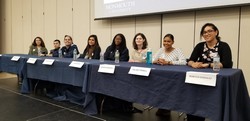Social Media Offers Pros and Cons
 Social media has grown to directly affect the lives of hundreds of millions of people every day. For many, social media is a source of news about our loved ones and even strangers. Now, social media is used by the University as a catalyst for keeping students informed and involved.
Social media has grown to directly affect the lives of hundreds of millions of people every day. For many, social media is a source of news about our loved ones and even strangers. Now, social media is used by the University as a catalyst for keeping students informed and involved.
The University’s use of social media has grown over the years to keep up with students’ use of social media. “I will ask students how they found out about meetings, and a lot of times they found out through Facebook,” said Susan Damaschke, Coordinator of First Year Retention.
“I think we’re seeing more students get involved, yes. Whether or not it has anything to do with Facebook, I’m not really sure,” Damaschke said. “I think they [students] are seeing more because they pay more attention to Facebook.” This year, Damaschke has reduced the amount of emails she sends and has found that attendance to events has been the same as in the past.
“It’s a great source to use other than email,” said Megan McGowan, Assistant Director of Student Activities.
“It’s a greener way to get information around.”
In some cases, however, Facebook has undoubtedly had a direct effect on attendance at certain events.
“Our first Residence Hall Association (R.H.A.) Late Night Lounge was a huge success because of Facebook,” said Alissa Catalano, a junior marketing major. “We (R.H.A.) didn’t put flyers out because of how close it was to the first day of school, so we just used Facebook. Over 70 people came.”
While social media, especially Facebook, may not be the best way to reach all groups of people, it has proven to be extremely successful in reaching the college community.
“When you want to reach out to the entire campus social media is a great way to go,” Catalano said. “People don’t always look at all the event boards but everyone is looking at Facebook.”
There are over 20 University related pages on Facebook, each having to do with clubs, departments or teams. Each class has its own page as well. As of Sunday, the Monmouth University Class of 2015 page has 1,031 members. That number is well over the Class of 2012 group which has just 758 members.
There are many reasons for differences in the number of members. One of which is simply because students may choose not to join or are unaware of the group.
However, the group for the class of 2015 may have inflated numbers. Many upperclassmen join the group as a way to advertise for future events. Orientation leaders or residence assistants and administrators also joined as a way to answer questions posted by students.
“Students should be able to come out more and ask questions and not be afraid but it helps when your shy or don’t know who to ask,” Catalano said. “When you’re on Facebook you can get 500 answers as opposed to one person’s answer.”
“I’ve seen a lot of students post questions and other students taking the time to post really specific and credible answers to those questions,” Damaschke said.
Upperclassmen may not have a need to get information on Facebook pages, which is another reason why the Class of 2012 page has fewer members.
According to Damaschke, each class’s Facebook page starts as an admission recruitment and information tool. Over the course of the summer, the page transitions into an information tool for orientation, helping students to find out what to bring and what to expect.
Students may use the page in the summer to meet with one another before the fall semester starts. There is always a surge of comments and people friend requesting one another after orientation, which she says is a good thing to see. This communication can create a comfort zone for students when they move in, Damaschke said.
Many students also use the group to get books they need for classes.
“I saw the Facebook page for the first time over the summer,” said Brandon White, a sophomore psychology major. White was checking the page daily when students started posting about books they need or have to give away.
“I was able to get my English book,” White said. “A lot of people were using it to get books.”
Damaschke also noted that many students posted about damages in the wake of Hurricane Irene and wanted to know about the damages on campus.
“I think it adds to the sense of community before they get here,” Damaschke said. “I don’t think it necessarily launches lifelong friendships between those students, but it definitely adds to the sense that we’re a community where people look out for each other.”
Use of certain pages increases drastically when school begins. According to McGowan, the week before the beginning of the fall semester there was only 176 monthly active users and 20 visits to the Student Activities Board page. During the first week of the semester, there were 557 monthly active users and 832 visits to the page.
The use of social media does present challenges.
Using different social media forms like Twitter or Foursquare requires more work than just signing up and posting. Damaschke says that in order to make a new page useful, especially Twitter, you have to post frequent updates. It is important to make it effective and launch it in a way that makes sense, she added.
“A lot of students aren’t on twitter,” said Catalano. “You can’t make an event and send it to everyone. If you’re trying to reach a large audience it’s not as effective as when you use Facebook.”
Another challenge presented is that no matter how much it is set up for school, people can use it however they want. Students also use it so much that they get nervous asking questions to people in person. Many students have become used to socializing on Facebook.
“It’s a balance of how we use Facebook in a way that makes sense because it can be so useful without relying on it too heavily that we lose the face-to-face person-to-person method of answering questions, advertising events or connecting students with resources,” Damaschke said. “All of us in the back of our minds have to consider the down side which is some students relying on it so heavily they lose the ability to talk.”
Damaschke said that roommates who have had conflict that have acted out on Facebook are an example of this overreliance.
Students also can post things that they do not really mean but do it on Facebook because they don’t have to see anyone face to face.
“Nervous people can put up a tough persona on the Facebook page when in reality they are just as nervous as anyone else,” Catalano said. “It definitely helps if you’re afraid to ask or really shy but it’s also counteractive to growing up.”
Despite the ease it can bring or the challenges it presents, social media is just beginning to take effect. The school is constantly working to expand its use.
According to Tyler Havens, Assistant Director of Student Activities for Fraternity and Sorority Life, Greek life will begin to integrate social media in the near future.
There is also discussion of placing barcodes on flyers so students can scan them and be directed to the student activities web page.
Catalano said she would like to see the school use it more because it’s what the generation depends on.


